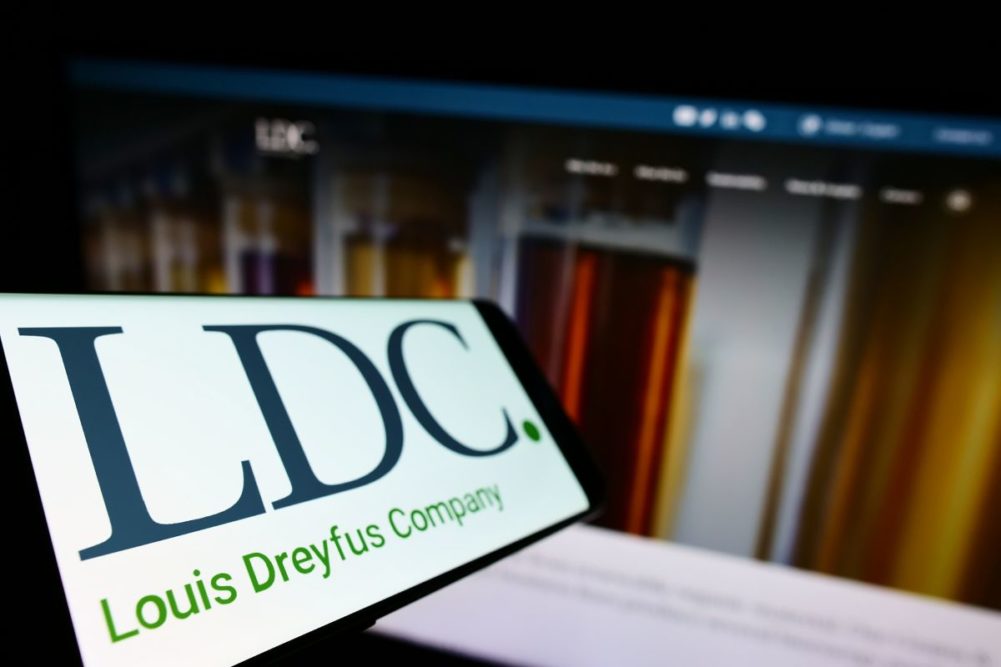ROTTERDAM, NETHERLANDS — Louis Dreyfus Co. said that despite ongoing geopolitical tensions and climate-related challenges, it had “resilient” results, with earnings decreasing 5.3% to $2.2 billion for the year ended Dec. 31, 2023.
Net sales reached $50.6 billion, down from $59.9 billion and segment operating results were $2.607 billion, down slightly from $2.611 billion.
“Both of our business segments contributed positively to our solid results for 2023, successfully navigating a complex environment, thanks to our global network, market insight and risk management capabilities, as well as an ongoing drive for cost and operational efficiency,” said Michael Gelchie, chief executive officer of LDC. “We advanced well in the pursuit of our strategic growth plans for LDC, while continuing to fulfill our fundamental role in bridging supply and demand gaps across essential food, feed, fiber and ingredient value chains, delivering for our customers around the world.”
The Value Chain segment, which includes the Grain & Oilseeds platform, saw operating results of $1.910 billion, up from $1.817 billion in 2022.
Net sales for the segment decreased 11.4% year-over-year mainly due to the lower price environment throughout the period for grain and oilseeds, LDC said. Volumes shipped by the Grains & Oilseeds platform were almost unchanged year-on-year.
The Grains & Oilseeds platform’s global footprint, and more integrated value chain management from origin to destination, supported improved financial performance in 2023, compared to an already strong 2022, the company said.
High crop yields in Brazil, combined with strong demand from China, opened profitable opportunities both at origin and destination for soy and corn businesses, LDC said.
The vegetable oils business saw robust results due to efficient hedging in the challenging market conditions of 2023, marked by a decline in prices, lower volatility and tight palm oil supplies.
Processing activities significantly contributed to enhanced platform performance, with strong crush and crack margins — particularly in North America, and large crop yields in Brazil. The platform’s activities in Argentina were affected by record low crops for soy, corn and wheat following drought, combined with low farmer selling and reduced biofuel processing margins. LDC’s recently expanded grains activities in Australia further supported the platform’s performance.
This was the first time the company released an integrated report including its financial results and progress in its sustainability roadmap.
“We continued to make important strides in our sustainability roadmap in 2023,” Gelchie said. “Importantly, we defined a strategy focused on six priority areas, identified through our 2022 materiality assessment and outlined in our report. The adoption of our Human & Labor Rights Policy and global Supplier Code of Conduct reflects our focus on further reinforcing LDC’s sustainability governance framework, in parallel to ongoing efforts in pursuit of our key decarbonization and zero-deforestation goals, as well as important progress in specific business lines.”
LDC’s Carbon Solutions team created a climate transition plan in 2023 with near-term targets to reduce Scope 1 and 2 emissions by 2030 and calculation of Scope 3 emissions for 2022, as a baseline for future target setting.
In 2023, a dedicated global team was also established to define and drive the development of LDC’s regenerative agriculture strategy at scale, to drive adoption of farming practices that improve soil health, promote biodiversity, restore aquifers and sequester carbon.
“As governments, consumers, partners and other stakeholders increasingly prioritize sustainable practices in their choices and actions, the long-term success, growth and resilience of our business is inextricably linked to our ability to carry out our business in a way that ensures fair and sustainable outcomes across value chains,” Gelchie said. “Looking ahead, I am convinced that LDC’s enduring commitment to growing our business through fair and sustainable value creation will position us for success in the future.”





